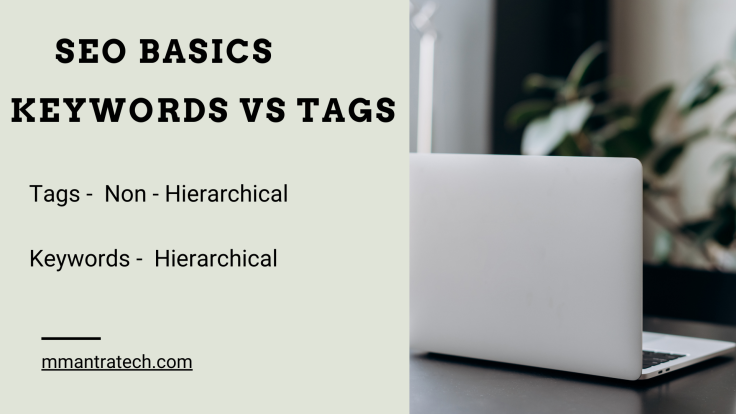Keywords vs. Tags: What’s the Difference and Why It Matters | SEO Matters.
- Posted on December 28, 2024
- SEO Basics
- By MmantraTech
- 547 Views
Hello everyone! I hope you're doing well. I'm thrilled to share this blog with you, as it explores essential SEO-related concepts that are important to understand. If you've ever dealt with SEO or content management, you've probably encountered the terms "keywords" and "tags."

KEYWORDS AND TAGS
What Are Keywords?
Think of keywords as the bread and butter of SEO. They’re the words and phrases that people type into search engines when looking for something. Keywords help search engines understand the topic of your content and decide how to rank it.
Keywords are hierarchical, which means they often follow an organized structure. For example:
- Primary Keyword: This is the main focus of your content. Example: “PHP Tutorials.”
- Secondary Keyword: These support the primary keyword. Example: “PHP Array Functions.”
- Long-Tail Keywords: These are more specific phrases. Example: “How to use array_multisort in PHP.”
- Focus: SEO (Search Engine Optimization).
- Purpose: Help search engines rank and match content with search queries.
When used effectively, keywords not only improve your ranking but also help attract the right audience. I recommend doing thorough keyword research using tools like Google Keyword Planner or Ahrefs to find phrases that align with what your audience is searching for.
What Are Tags?
Tags, on the other hand, are less about SEO and more about organizing content within your website or blog. They are non-hierarchical labels used to group similar topics together. Tags help users easily navigate your site and find related content without diving into a deep menu structure.
- Focus: Categorization (within a website or blog).
- Purpose: Organize content for users, making it easy to browse related topics.
- Example:
"PHP, tutorials, functions, web."
For example, if I were writing multiple articles about web development, I might use tags like:
- “PHP”
- “Web Development”
- “Coding Tips”
These tags don’t have a specific order or priority. Their job is to make my content more user-friendly by linking articles under the same umbrella.
Keywords vs. Tags: A Side-by-Side Comparison
|
Aspect |
Keywords |
Tags |
|
Purpose |
SEO and search engine ranking |
Content organization for users |
|
Nature |
Hierarchical |
Non-hierarchical |
|
Usage |
Targets search engine algorithms |
Helps users navigate the website |
|
Examples |
“PHP Tutorials,” “PHP Functions” |
“PHP,” “Web Development” |
Why Does This Matter?
Understanding the difference between keywords and tags can save you a lot of confusion and time. Keywords are what bring people to your site by improving its visibility on search engines. Tags, however, keep users engaged by helping them find related content quickly.
Here’s how I approach it:
- For SEO: I focus on finding the best keywords and strategically placing them in my content, headings, meta descriptions, and URLs.
- For User Experience: I use tags to make my content library easy to browse, ensuring visitors stick around longer.
My Final Thoughts
Both keywords and tags are essential, but they’re not interchangeable. By leveraging the power of keywords to attract visitors and tags to enhance their experience, you can create a website that’s both search engine-friendly and user-friendly.
If you’re just getting started, focus on mastering keywords first, as they’ll have a direct impact on your traffic. Once your content grows, use tags to organize everything in a way that makes sense for your audience.
Got any questions about using keywords or tags? Let me know in the comments—I’d love to help!



Write a Response